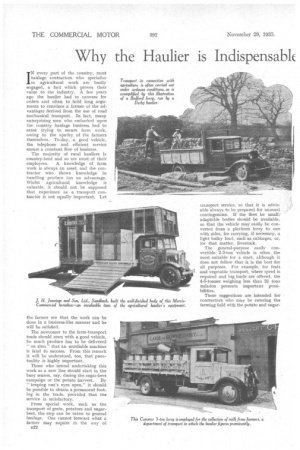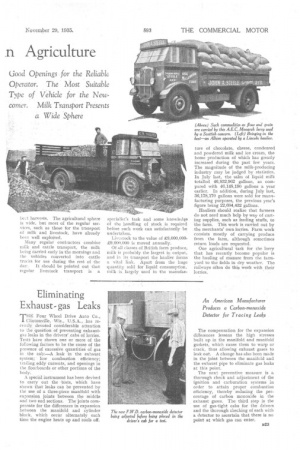Why the Haulier is Indispensabk n Agriculture
Page 36

Page 37

If you've noticed an error in this article please click here to report it so we can fix it.
Good Openings for the Reliable Operator. The Most Suitable Type of Vehicle for the Newcomer. Milk Transport Presents a Wide Sphere IN every part of the country, most haulage contractors who specialise in agricultural work are busily engaged, a fact which proves their value to the industry. A few years ago the haulier, had, to canvass for orders and often to ,hold long arguments to convince a farmer of the advantages derived frorn the use of road mechanical transport. In fact, many enterprising men who embarked upon the country haulage business had to cease trying to secure farm work, owing to the apathy of the farmers themselves. To-day, a good vehicle, the telephone and efficient service ensure a constant flow of business.
The majority of rural hauliers is country-bred and so are most of their employees. A knowledge of farm work is always an asset, and the contractor who shows knowledge in handling produce has an advantage. Whilst agricultural knowledge is valuable, it should not be supposed that experience as a transport contractor is not equally important. Let the farmer see that the work can be done in a business-like manner and he will be satisfied.
The newcomer to the farm-transport trade should start with a good vehicle. So much produce has to be delivered " on time" that an unreliable machine is fatal to success. From this remark it will be understood, too, that punctuality is highly important.
Those who intend undertaking this work as a new line should start in the busy season, say, during the sugar-beet campaign or the potato harvest. By " keeping one's eyes open," it should be possible to obtain a permanent footing in the trade, provided that the service is satisfactory.
From special work, such as the transport of grain, potatoes and sugarbeet, the step can be taken to general haulage. One cannot forecast what a farmer may require in the way of B22 transport service, so that it is advisable always to be prepared for unusual contingencies, If the fleet be small', adaptable bodies should be available, so that the vehicle may easily be converted from a platform lorry to one with sides, for carrying, if necessary, a light bulky load, such as cabbages, or, for that matter, livestock.
The general-purpose easily convertible 2-3-ton vehicle is often., the most suitable for a start, although it does not follow that it is the best • for all purposes. For example, for fruit and vegetable transport, where speed is required and big loads are offered, the 4-5-tonner weighing less than 2/ tons unladen presents important possibilities.
These suggestions are intended for • contractors who may be entering the farming field with the potato and sugar bet harvests. The agricultural sphere is wide, but most of the regular services, such as those for the transport of milk and livestock, have already been well exploited.
Many regular contractors combine milk and cattle transport, the milk being carried early in the mornings and the vehicles converted into cattle trucks for use during the rest of the day. It should be pointed out that regelar livestock transport is a specialist's task and some knowledge of the handling of . stock is required before such work can satisfactorily be undertaken.
Livestock to the value of £8,000,000£9,000,000 is moved annually,
Of all classes of British farm produce, milk is probably the largest in output, and in its transport the haulier farms a vital link. Apart from the huge quantity sold for liquid consumption, milk is laegely Used in •the manufae
ture of chocolate, cheese, condensed and powdered milk and ice cream, the home production of which has greatly increased during the past few years. The magnitude of the milk-producing industry may be judged by statistics. In July last, the sales of liquid milk totalled 46,832,962 gallons, as compared with 46,148,190 gallons a year earlier. In addition, during July last, 36,178,170 gallons were sold for mannfacturing purposes, the previous year's figure being 22,604,432 gallons.
Hauliers should realize that farmers do not need much help by way of carting supplies, such as feeding stuffs, to the farm. This work is carried out by the merchants' own loeries. Farm work consists mostly of carrying produce from the farm, although sometimes return loads are requested.
One agricultural task for the lorry that has recently. become popular is the hauling of manure from the farmyard to thefields in dry weather. The railways often do this work with their lorries.




























































































